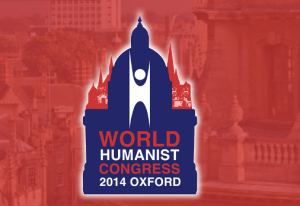1000 humanists from over 60 countries are assembling in Oxford today for the 2014 World Humanist Congress. This triennial gathering of members of the International Humanist and Ethical Union (IHEU) unites men and women from across the globe who believe that we can live ethical and fulfilling lives on the basis of reason and humanity alone, without religious beliefs.
Britain last hosted the event in 1978, having played a pivotal role in the founding of IHEU just after World War Two. The first Secretary of IHEU, Harold Blackham, and its first President, Sir Julian Huxley, were both British and Britain has long played an important role in humanism internationally.
It was in Britain that the last congress of the World Union of Freethinkers – the predecessor body of IHEU – was held in the 1930s before the humanist movement was trampled between the twin onslaughts of fascism and communism (atheist organisations were the first organisations banned by the Third Reich and the liberal values of humanist organisations in communist states led to their suppression) and in relation to both humanism and to the theme of this year’s Congress – freedom of thought and expression – Britain has a enviable track record relative to many other nations.
The BHA’s work, however, is far from limited to serving those who recognise that they are humanists. Trying to forge a strong humanist community is not just important because of the psycho-social benefits it can bring to its members, but because having a recognised non-theist presence in Britain weakens the grip of unrepresentative religious orthodoxies on public policy that should be made with all in mind. We are on the frontline of the campaign for a secular state because we believe that mixing religion and politics inevitably excludes and divides. We campaign against faith schools because they are often socio-economically exclusionary and because children grow up more tolerant when they are exposed to diverse classes and unbiased teaching about different ways of life.
Because ethical living and equality of dignity are such central tenets of the humanist credo, meanwhile, humanists are doing invaluable work improving Britain for everyone, regardless of who you are or what you believe. We were the only national organisation supporting Paul Lamb and the late Tony Nicklinson in their action to win the right to choose how they die and have thus helped accelerate the issue’s passage into parliament, after the Supreme Court ruled that legislative reform was now a glaringly urgent imperative. We stand up for human rights at home and abroad, and make frequent representations to the United Nations, highlighting appalling violations of the liberty of women, non-believers, and many others wherever and however they occur.
No country has a perfect heritage. Humanists and other dissenters in our country were persecuted and even executed in Britain in previous centuries an even today there is state-sanctioned discrimination against us – in access to state services like a third of our schools, for example. This Friday – the opening day of the World Humanist Congress – also marks the centenary of the Defence of the Realm Act, which suspended free speech for the duration war and saw the successful prosecution of Bertrand Russell and many other with unpopular opinions, but when we welcome the world to Oxford this week, we are proud that they will be hosted by a community that is in a rude state of health. Our challenge now is to make sure that continues and to use our good fortune to reach out to others in less fortunate circumstances.
